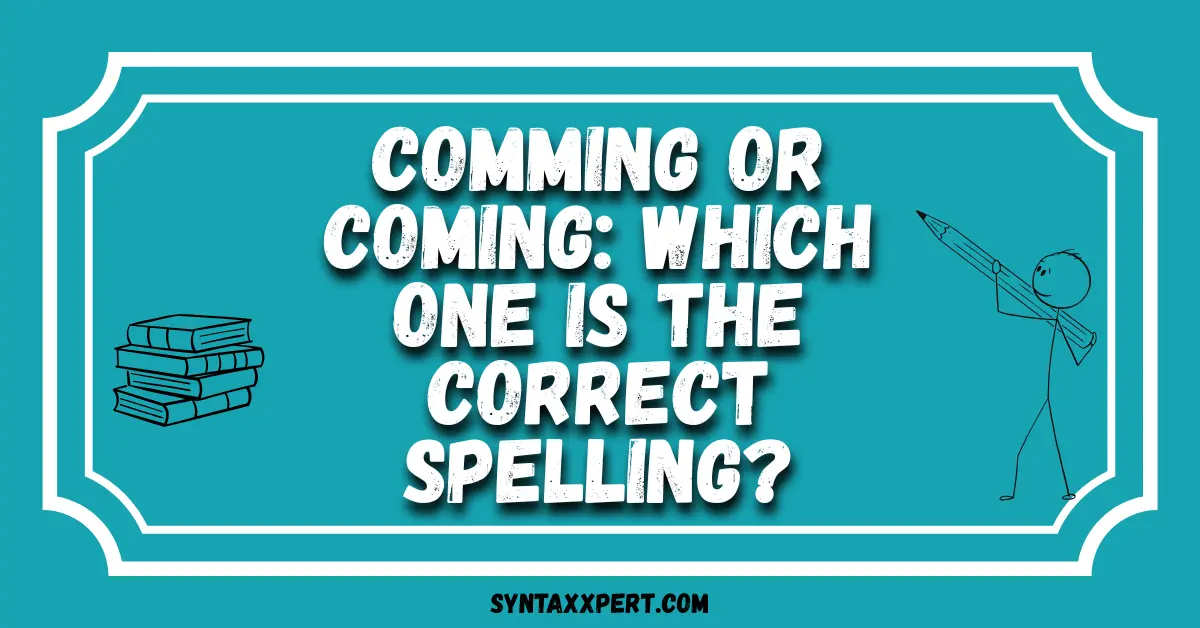Comming or coming—if this pair has ever made you pause before pressing “send,” you’re not alone. Many English learners (and even native speakers) struggle with words that look similar or sound identical.
The truth is simple: “coming” with one m is correct, while “comming” is a misspelling. But understanding why helps you avoid repeating the mistake. Let’s explore the grammar, rules, and logic behind this common confusion.
Quick Answer — It’s “Coming,” Not “Comming”
If you’re looking for a quick verdict, here it is: ✅ Correct: coming ❌ Incorrect: comming
Coming is the present participle of the verb come. You form it by dropping the silent “e” and adding “-ing.”
Example: She’s coming to the meeting early.
Comming, on the other hand, doesn’t exist in modern English dictionaries. It occasionally appeared centuries ago, but today, it’s simply a typo.
Why “Comming” Is Wrong and “Coming” Is Correct
English spelling may feel inconsistent, but there are solid rules guiding when to drop letters or double consonants.
The Silent “E” Rule
When a verb ends with a silent “e,” you usually drop the “e” before adding “-ing.” This keeps the pronunciation smooth and avoids awkward clusters.
| Base Verb | Add “-ing” | Correct Form | Rule |
| come | drop e + ing | coming | silent “e” dropped |
| make | drop e + ing | making | silent “e” dropped |
| write | drop e + ing | writing | silent “e” dropped |
So come → coming follows the same pattern as make → making.
Why We Don’t Double the “M”
English doubles the final consonant before adding “-ing” only when:
- The word ends with a consonant-vowel-consonant pattern.
- The last syllable is stressed.
For example:
- run → running (short vowel + stressed final syllable)
- stop → stopping
- swim → swimming
The word come doesn’t meet these conditions—its stress falls on the only syllable, but it ends with a silent “e,” not a consonant-vowel-consonant pattern. Therefore, we don’t double the “m.”
Common Reasons People Misspell “Coming” as “Comming”
Even though the rule is straightforward, spelling errors happen for a few reasons:
- Overgeneralizing the double-consonant rule. Many assume every verb doubles a letter before adding “-ing,” like run → running. Come → coming breaks that expectation.
- Typing or phonetic habits. When typing fast, doubling the “m” feels natural because the sound seems prolonged.
- Learner confusion. English learners sometimes apply pronunciation logic instead of spelling rules.
- Visual mix-ups with similar words. Combing (brushing hair) or cumming (a vulgar slang) can cause subconscious mix-ups. Always check your context—one letter can completely change meaning!
Meaning and Usage of “Coming”
“Coming” serves multiple grammatical roles, which is why it appears frequently in writing and speech.
As a Verb (Present Participle)
Used with auxiliary verbs like is, are, or was to show continuous action.
She is coming home soon.
As an Adjective
Describes something approaching or about to happen.
The coming election will be decisive.
As a Noun
Refers to an arrival or an approaching event.
The coming of spring brings new beginnings.
Pronunciation
The word coming is pronounced /ˈkʌm.ɪŋ/. That short “u” sound often makes people imagine an extra m, but it’s just the sound—not the spelling.
“Comming” in Historical or Obsolete Usage
Interestingly, the form “comming” once appeared in old English manuscripts. For example, you might find it in texts from the 14th or 15th century, when spelling wasn’t standardized. However, as dictionaries like the Oxford English Dictionary and Merriam-Webster formalized spelling, “comming” vanished. Today, it’s marked as archaic or incorrect—a fossil from English’s unpredictable past.
Grammar Rules to Remember for Adding “-ing”
Learning the broader pattern can prevent dozens of similar errors. Here’s a simple guide:
| Rule | Example | Correct Form |
| Drop silent “e” | make → making | making |
| Double final consonant (if stressed) | run → running | running |
| Keep “e” when it changes meaning | see → seeing | seeing |
| Replace “ie” with “y” | lie → lying | lying |
A quick memory tip:
“If the word ends in e, drop it with glee before adding -ing.”
Common Confusing Words Related to “Coming”
To avoid awkward errors, know the look-alike words people confuse most often:
| Word | Meaning | Example | Common Confusion |
| Coming | Arriving / happening soon | He’s coming to class. | Correct spelling |
| Combing | Brushing hair | She’s combing her hair. | Visually similar |
| Cumming | Vulgar slang | Avoid this in formal writing. | Phonetically similar |
Each carries a completely different meaning. A single letter can shift your message from professional to embarrassing.
Case Study: How One Misspelling Changed a Job Application
In 2022, a job seeker posted on LinkedIn:
“Thank you for comming to my interview today!”
The recruiter kindly replied, “You mean coming?” but the post had already gathered dozens of likes and screenshots. This small typo didn’t ruin their chances—but it did highlight how spelling affects credibility. Even a single extra “m” can make readers question attention to detail.
Moral of the story: a quick proofread saves embarrassment.
Read More >>> Companywide or Company Wide: Which Is Correct?
Tips to Avoid Spelling Mistakes Like “Comming”
Here are practical ways to ensure “coming” (and other verbs) stay correct:
- Apply the rule consciously. If a verb ends in a silent “e,” drop it before adding “-ing.”
- Use spelling tools wisely. Programs like Grammarly or ProWritingAid instantly flag “comming” as an error.
- Proofread backward. Reading your text from end to start helps you notice unusual letter patterns.
- Learn by families of words. Once you know make → making and come → coming, the pattern sticks.
- Create simple mnemonics. “Come drops the e before it comes in.” It sounds silly, but it works!
Examples of “Coming” Used Correctly
| Sentence Type | Example |
| Verb | “He’s coming to help us tomorrow.” |
| Adjective | “The coming year looks bright for small businesses.” |
| Noun | “The coming of technology changed everything.” |
Notice how the word adapts to different grammatical roles without changing its spelling.
Fun Facts About the Word “Coming”
- The word dates back to Old English cuman, meaning “to move toward.”
- It appears in Shakespeare’s plays more than 200 times.
- “Coming soon” remains one of the most used marketing phrases worldwide.
- In modern corpora, “coming” occurs over 200 times per million words, making it a top 1% frequency English word.
Frequently Asked Questions
Is “Comming” Ever Correct?
No. Comming might appear in extremely old texts, but modern English marks it as incorrect. Always write coming.
Why Is It “Coming” and Not “Comming”?
Because of the silent “e” rule—verbs ending in a silent e drop it before adding “-ing.” Doubling the consonant isn’t needed.
Is “I’m Coming” Grammatically Correct?
Yes. It’s a common phrase using the present continuous tense (be + verb-ing) meaning someone is on their way.
Is “Comming” a Word in English?
Not in standard English. It’s listed in most spell checkers as a misspelling.
What Are Common Words People Misspell Like “Comming”?
- beggining → beginning
- runing → running
- makeing → making
- comeing → coming
Each follows a similar pattern of misunderstanding English spelling rules.
How Can I Remember the Correct Spelling?
Associate “coming” with come + ing (drop the “e,” keep it simple). Or think of it as:
“When you’re coming, let the e go—it’s staying home!”
Final Thoughts
Learning the difference between comming and coming might seem tiny, but it reflects a bigger principle: English spelling follows logic, even when it hides behind exceptions. If you remember one thing, let it be this:
Drop the “e” before adding “-ing.”
“Coming” is a small word that carries big lessons about accuracy, attention, and professionalism. Whether you’re writing an email, a report, or a social post, a little care in spelling goes a long way.
As the old saying goes, “Good writing is like good manners—it’s noticed most when it’s missing.”
Quick Recap Table
| Question | Short Answer |
| Which is correct, comming or coming? | Coming |
| What’s the rule? | Drop the silent “e” before adding “-ing.” |
| Why not double the “m”? | Because come ends with a silent “e,” not a consonant-vowel-consonant. |
| Is “comming” ever used? | Historically yes, but obsolete now. |
| Best tip to remember? | “Come drops the e before it comes in.” |

I’m Luna Hazel, a grammar expert here to help you master the art of clear, confident writing. Let’s make every word count!

